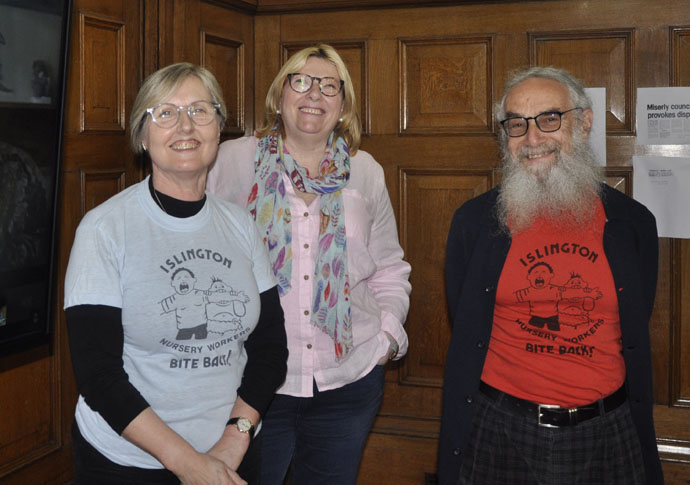Most of us were working-class women who wouldn’t have asked for pay rises
Four decades after 14-week walkout, nursery strikers share memories of standing up to council
Friday, 19th April 2024 — By Isabel Loubser

Julia Manning Morton, left, with former strikers at the event on Monday
FORMER strikers came together on Monday to share their memories of the Islington nursery dispute, 40 years on.
Hosted by UNISON, they gathered in the same room in the Town Hall where they met the council on the eve of the action, in April 1984, which saw 154 nursery workers from 12 separate council-run daycare centres walk out on indefinite strike.
Julia Manning-Morton was 26 when she joined the strike. At the time, she was a deputy manager at a children’s day nursery in Archway.
“My experience was frequently working with a large group of children on my own,” she said.
“Sometimes a group of 12 children between the ages of two and five – I can’t imagine how I managed back then.”
One of the strikers’ demands was that each nursery worker should have fewer children to look after.
Over 14 weeks, they picketed and protested, even occupying the Town Hall overnight, shouting the slogan “1 to 4 and not 1 more”.
Ms Manning-Morton said: “We had such amazing support from the families, they came on demonstrations with us, they helped with picketing, they even occupied the Town Hall council chamber, and brought painting activities for the children.”
She added: “It was hard for many of them, but at that time, there was a lot of affinity between practitioners and parents because we came from the same communities, our incomes were similar, there was a shared socio-cultural understanding.”
Karen Quinn started working in Islington nurseries when she was just 16 years old. By the time of the strike, she had been looking after children for 10 years.
“I was earning 65 pounds a month when I started,” she said.
“Most of us were young working class women who didn’t have a clue and would never have asked for more money and things like that,” she added.
Ms Quinn was part of the group which drew up a set of proposals about working conditions and pay that they presented to Islington Council on the eve of the strike.
“They read what we were asking for and turned to us and said, ‘I’m sorry, girls, there’s no more money in the pot and there’s nothing we can do’,” Ms Quinn said.
She continued: “It was the first time in my life that I thought ‘no one will call me a girl again’. I didn’t want to go on strike but I thought ‘we can’t let ourselves be treated like this’.”
After three months of demonstrations, Islington Council, led by Margaret Hodge, finally conceded, and a maximum ratio of 1:4.5 was achieved in council nurseries, and 26 more members of staff were recruited. Ms Manning-Morton said: “It did help. It wasn’t perfect, but it did help.”
On The Record, a Caledonian Road-based oral history project which records and archives people’s experiences of important events, organised the 40th anniversary meeting.
They are now appealing for more former strikers, parents and children who used the nurseries to come forward and share their experiences.
Ms Manning-Morton said: “Hats off to On the Record, they’ve made this all happen and it’s very gratifying to have what we did acknowledged as an important part of social history.”